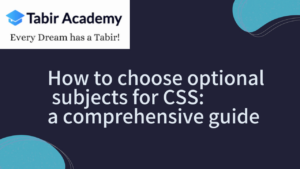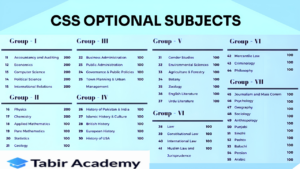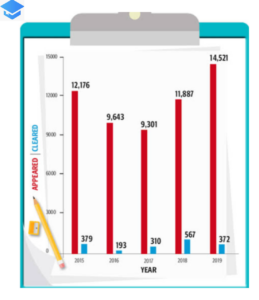
How to Choose Optional Subjects in CSS: A Comprehensive Guide
Description

Selecting the right optional subjects for the CSS (Central Superior Services) exam is a pivotal decision that can significantly influence your performance and overall success. With numerous subjects to choose from, making an informed choice requires careful consideration of several factors. Here’s a detailed guide on how to choose your optional subjects, incorporating key considerations to ensure you make the best decision
Key Considerations for Choosing Optional Subjects:

1.Background Degree:
Your academic background is a crucial factor when selecting optional subjects. Opting for subjects related to your degree can leverage your existing knowledge and make your preparation more efficient. Subjects aligned with your educational background will likely be easier to grasp, reducing the learning curve and making your study sessions more productive.
Example: If you have a degree in engineering, subjects like Physics or Mathematics could be advantageous due to your familiarity with the material. Conversely, if your background is in social sciences, subjects such as Sociology or Political Science might be more appropriate. Tip: Compare the syllabus of potential optional subjects with the content of your degree. Choose subjects that complement your existing knowledge base to streamline your preparation process.
Political-Science-CSS-Syllabus
2.Interest in subject:
Your interest in the subject is crucial for maintaining motivation and engagement throughout your preparation. Selecting subjects that you are passionate about can make studying more enjoyable and less of a chore. When you are genuinely interested in a subject, you are more likely to invest time and effort, which can lead to better results.
3.Scoring Potential
Choosing a high-scoring subject is crucial in the CSS exam because achieving a high score is essential for securing a final allocation. Some subjects are known for their higher scoring potential due to their well-structured syllabus, abundance of study resources, and favorable trends in examination patterns. To maximize your chances of success, it's important to select subjects that have historically yielded higher average scores. For example, Sociology, Punjabi, Political Science, and Public Administration are often cited as relatively high-scoring options. Their clear and concise syllabi and extensive availability of preparatory materials contribute to their scoring potential, making them strong choices for candidates aiming to excel and ensure a competitive edge in the final allocation.
4.Safest Subject Not Targeted by FPSC:
The Federal Public Service Commission (FPSC) may occasionally alter the focus or style of questions. Choosing a subject that is less likely to be targeted for radical changes can be advantageous. Research historical patterns and recent changes in the exam format to identify subjects that have been relatively stable.

5.Justify Your Choice in the Interview:
Your choice of optional subjects should be justifiable not only in your written exams but also during the interview stage. You must be able to confidently explain why you selected a particular subject and how it aligns with your background, interests, or future career goals. The subject should complement your overall profile and career aspirations, allowing you to provide a coherent rationale during the interview.

6.Time and Effort Required:
Evaluate the time and effort required to prepare for the subject. Some subjects may demand extensive study time and in-depth research, while others might be more straightforward. Choose a subject that aligns with the amount of time you can realistically commit to your preparation.
7.Previous Years' Trends and examiner's report:
Study previous years' examination trends to understand how the subject has been tested in the past. Look at the types of questions asked, the weightage of the subject, and any changes in the examination pattern. This can provide insights into the subject's relevance and difficulty. Always go through the examiner's report to understand the subjects requirements.
Making the Decision:
With the above considerations in mind, follow these steps to make your final decision:
- List Potential Subjects: Based on your academic background, interests, and research, create a list of potential optional subjects.
- Conduct a Detailed Analysis: For each subject, evaluate its syllabus, scoring potential, availability of resources, and stability.
- Seek Guidance: Consult with previous CSS candidates, mentors, or experts to gain insights into the subjects you are considering.
- Reflect on Your Goals: Align your subject choice with your career goals and the justification you can provide during the interview.
- Make an Informed Choice: Based on your analysis and consultations, select the subject that best fits your needs and preparation strategy.
Conclusion:
In conclusion, choosing the right optional subjects for the CSS exam is a pivotal step towards achieving your goals. By carefully evaluating your academic background, interests, and the potential for high scores,you set the foundation for effective preparation and a strong performance. A thoughtful selection not only enhances your chances of success in the exam but also aligns with your career aspirations, paving the way for a fulfilling career in the civil services. Make a well-informed choice to turn your aspirations into tangible achievements.
